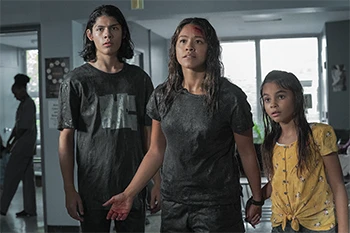Awake has an intriguing setup. A cosmic event wipes out all electronics on Earth, but more alarming renders all humans unable to sleep. Exactly how this causality works is not explained in detail, but the consequence is a collective death sentence drawn out over a few days, during which people turn more and more erratic, paranoid, and violent. Why we sleep is still somewhat a mystery, except that it seems absolutely necessary sooner or later, and the longer we stay awake, the more our brain starts playing tricks.
Gina Rodriguez plays Jill Adams, formerly in the military and with – it is hinted – a history of substance abuse. She works as a security guard doing night shifts at some kind of laboratory where Murphy, played by Jennifer Jason Leigh, carries out sleep research. The two of them served together during the war – we don’t know which one – where Murphy seemingly worked on the darker side of interrogation techniques related to sleep and sensory deprivation. When the catastrophe hits, lab activities move swiftly to a remote hub where scientists from around the country are supposed to gather and come up with a cure for this mass insomnia. Jill is offered to join but opts to stay behind with her son Noah and daughter Matilda, both with whom she has a strained relationship. Protecting them is especially important since everyone wants to claim Matilda after discovering she is one of only two people known to have slept since all this started. What follows is a survival road trip looking for answers and preparing for the worst while humanity’s clock is ticking.
There is nothing wrong with how Awake is crafted in terms of acting, cinematography, and so on. But even though the core parts of the plot are fascinating, they are buried beneath a large number of potential storylines that could have been explored to much greater satisfaction. For example, what is the exact nature of Jill’s background, and what did she and Murphy do during the war? How can a solar flare affect the brain, and why does sleep deprivation turn people aggressive? How did anything get organised if all electronics are gone and communication essentially impossible? The impression is that everything that has to do with the event itself is intentionally kept obscure, the film instead centring on Jill and her children’s struggle and salvation. (Speaking of salvation, Awake early on introduces a Christian theme that could have been subtext but is so overt that the final moments feel almost like a cliche.) However, that struggle is not the most engaging either, in large part because we don’t know very much about Jill or her family.
Not every sci‑fi movie has to focus on the (fictional) science or explain all circumstances. But when the story leaves out too much sowing of seeds that, after all, were planted, it’s more frustrating than intriguing. Awake works extensively with themes and symbolism. That would have been fine if it weren’t for simultaneously introducing so many concrete scientific questions waiting to be answered and character backgrounds to detail. The idea of an entire world population slowly descending into madness not by a zombie disease or mind control but by something so familiar as lack of sleep could have made for a far more interesting take. It is delightful, though, to see Gina Rodriguez return to the science fiction genre for the first time since Annihilation. Once again, she shows that playing a tough and resourceful survivalist suits her very well.

